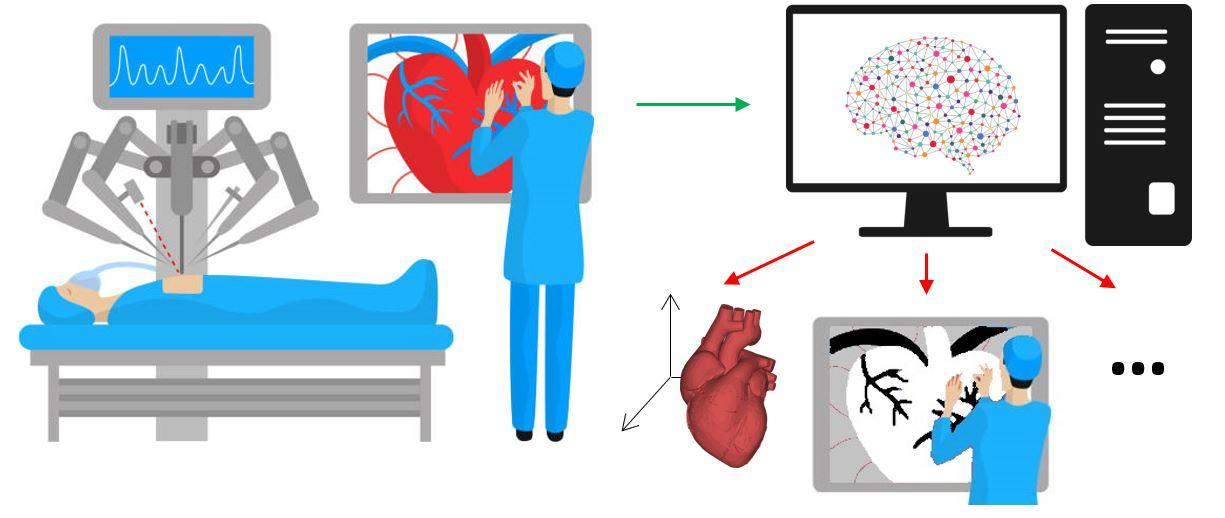Espositori 2020
- CULTURAL HERITAGE
- AEROSPACE
- ARTIFICIAL INTELLIGENCE
- DRONES
- EDUCATION
- ENERGY & SUSTAINABILITY
- FOOD & AGRICULTURE
- HOME AUTOMATION
- INTERNET OF THINGS
- KIDS & EDUCATION
- NEW MANUFACTURING
- OPEN SOURCE
- RECYCLING & UPCYCLING
- ROBOTICS
- SCIENCE
- 3D PRINTING
- ART
- ARTISANS & NEW CRAFT
- BIOLOGY
- FABRICATION
- GAMES
- HACKS
- STEAM PUNK
- WELLNESS & HEALTHCARE
- YOUNG MAKERS (< 18)
- 3D SCANNING
- MUSIC & SOUND
- FASHION & WEARABLES
Let the images assist you: image-based assistance in minimally invasive surgery
During recent years minimally-invasive surgery (MIS) has seen a tremendous development. MIS allows safer interventions, shorter recovery time with less risk of infection and complications, but it comes at the price of several new challenges for surgeons, as reduced field-of-view, reduced dexterity and absence of touch feedback. At NearLab we are focusing on the development of methods to automatically process videos from surgical cameras, in order to provide assistance to surgeons by automatically locating anatomical structures, virtually increasing the camera field-of-view, estimating 3D pose of surgical tools and more.
NearLab - Neuroengineering and medical robotics, Politecnico di Milano
Luca Sestini was born on December 17th, 1995, in Arezzo, Italy. In July 2017, he obtained the Bachelor of Science in Biomedical Engineering at Politecnico di Milano. In October 2019, he obtained the Master of Science in Biomedical Engineering at Politecnico di Milano, defending the thesis “Surgical Path Planner for Steerable Catheters with Reinforcement Learning Approach”. Since November 2019, Luca is currently at CAMMA research group at the University of Strasbourg, for a joint Ph. D. along with Politecnico di Milano, as Early Stage Researcher with the Marie Curie ATLAS project under European Union Innovative Training Network. His main research interests include Deep Learning and Computer Vision, in the field of Minimal Invasive Neurosurgery.
Aldo Marzullo is affiliated researcher at the Department of Mathematics and Computer Science of the University of Calabria (Italy). He received his Double Ph.D. in Computer Science and Biomedical Engineering at University of Calabria and University Claude Bernard Lyon 1 (Lyon, France). Currently, he is working on Deep Learning techniques for Computer Vision in Medical Imaging, in close collaboration with Prof. Elena De Momi and Prof. Francesco Calimeri.
Alessandro Casella graduated in Biomedical Engineering in 2017 and specialised in Technologies for Electronics at Politecnico di Milano in April 2019. He started the Biomedical Engineering PhD in May 2018 at Polytechnic University of Milan, together with the Neuroengineering and Medical Robotics Laboratory (NearLab), collaborating with IIT, under the supervision of Leonardo de Mattos of the Advanced Robotics Department (IIT). His main research is focused on the development of computer vision and deep learning techniques for minimally invasive fetal computer-aided surgery.
Chiara Galli de Paratesi is currently a M.Sc. candidate at Politecnico di Milano.
Jorge studied Mechatronics Engineering at the National Polytechnic Institute of Mexico (IPN) and Physics at the National Autonomous University of Mexico (UNAM). He continued with his Master of Science (M. Sc.) in Physics, Biological Physics and Computational Biology at Lund University, Sweden.
He obtained his M. Sc. degree in 2019 working in an interdisciplinary project, under the guidance of Prof. Mattias Ohlsson at the department of Computational Biology and Biological Physics of LU, analysing multi-spectral airborne data to detect archaeological ruins using Computer Vision and Deep Learning methods.
Jorge is currently at The Department of Electronics, Information and Bioengineering (DEIB) of Politecnico di Milano (POLIMI) for a joint Ph. D. along with Université de Strasbourg (UNISTRA), as Early Stage Researcher in the Marie Curie ATLAS project under the European Union Innovative Training Network.
Salih Ertug Ovur is currently a Research Assistent at NearLab, Politecnico di Milano.
Tommaso Da Col was born on November 17th, 1994 in Abbiategrasso (MI), Italy. He obtained the bachelor of Science in Biomedical Engineering in 2017 and the Master of Science in Biomedical Engineering – Technologies for Electronics in 2020 at Politecnico di Milano. He is currently a Graduate Engineering Trainee with the Neuroengineering and Medical Robotics Laboratory (NEARLab) at Politecnico di Milano. His research focuses on robotics, in particular robotic-assisted minimally invasive surgery and socially assistive robotics.



















































































